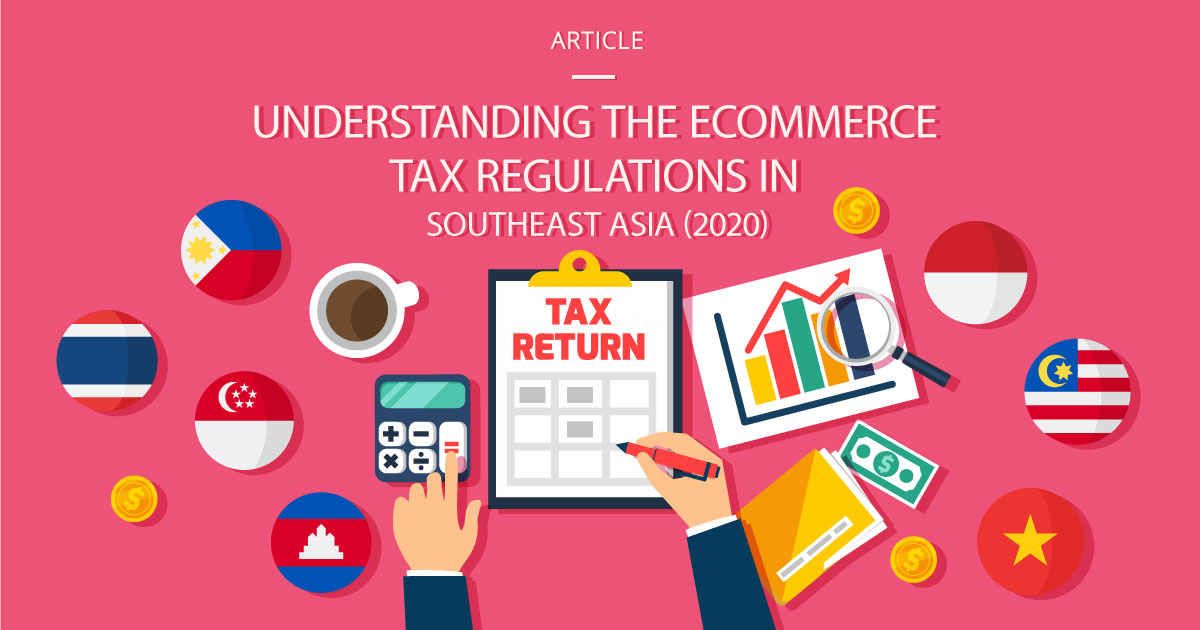Today, we will talk about every entrepreneur’s favourite topic: taxes!

Come on. We know that no one truly likes taxes. But for online sellers, particularly those doing cross border fulfilment, understanding the rules and fees that apply in both their home country and the markets to work with is an important part of the selling process—and shows your audience that you are committed to conducting your business in a responsible way.
Now that eCommerce platforms are an integral part of many Southeast Asian nations’ business ecosystems, their respective governments are figuring out how eCommerce products should be taxed. Most countries in Southeast Asia have already ratified or are in the process of passing eCommerce tax laws.
Although legislation in Cambodia, Indonesia, Malaysia, the Philippines, Thailand, Singapore, and Vietnam share similarities, each country has its own unique fees that sellers must pay to keep doing business. In this article, we will explore the current landscape facing retailers and brands throughout the region.
*All monetary conversions are correct as of 26 March 2020.
Cambodia
While Cambodia’s eCommerce ecosystem can be considered underdeveloped in comparison to those of its neighbours, its continued growth shows promise. As of late 2018, the number of active Internet users in the Kingdom grew from 28,000 to 7.1 million over a period of just eight years.
The country’s eCommerce revenue is also expected to show a 10.6% compound annual growth rate (CAGR) from 2020 to 2024, leading to US$537 million in market volume. In short, it’s going to have so many potential new customers—and profits!
To prepare for this market expansion, the National Assembly approved a draft law on eCommerce in November 2019 from the Ministry of Commerce and the Asian Development Bank. Its 12 chapters and 67 articles are intended to regulate Cambodia’s eCommerce growth, provide increased opportunity to SMEs and protect customers, and encourage transparency and compliance for all involved parties.
As of March 2020, the eCommerce law is still under a moratorium, with two months to go before it’s lifted.
Indonesia
In Indonesia, eCommerce providers are classified as PPSME and include online retail websites, online classified ads, price comparison websites, and daily deal websites. Sellers and service providers classified as SMEs (locally known as UMKM) pay 0.5% income tax. Large companies pay a flat 25% corporate tax rate.
Additionally, individual taxpayers who are earning at least Rp4.8 billion (around US$297,000) from selling online must pay value-added tax (VAT). Currently, Indonesia charges 10% VAT on all goods and services.
Malaysia
The Service Tax (Amendment) 2019 Bill was approved by the Dewan Rakyat on April 8, 2019. This bill introduced a 6% tax on all foreign-registered persons providing digital services to Malaysian consumers, effective on 1 January 2020. This law impacts:
- Individuals who sell digital products to consumers
- Individuals who sell digital products through intermediaries such as online eCommerce platforms and issues the invoice for these sales
- Online platforms that make sale transactions on behalf of the overseas service provider and issues an invoice under the platform’s own name
A Customs Department spokesman revealed that as of December 2019, at least 126 foreign digital service providers registered for the tax—including Netflix, Spotify, Airbnb, and Google. The GST will apply to cross-border B2C and B2B digital services and is projected to rake in approximately RM2.4 billion (around US$548 million) in tax revenue yearly.
The Philippines
The Philippines is notable for being one of the first Southeast Asian countries to develop a clear eCommerce taxation system. Filipino eCommerce sellers must pay 12% VAT on online sales worth more than PH₱1.92 million (around US$37,600) a year. Transactions below this threshold are charged 3% VAT. These fees have been in place since 2016.
Philippines residents who buy goods worth more than PH₱10,000 (around US$195) from international online sites have to bear the 12% VAT on their own.
Thailand
According to Thailand’s current domestic tax law, only Thai sellers providing goods or services and earning revenue above TH฿1.8 million (around US$55,000) must pay 10% VAT. Right now, foreign operators of eCommerce businesses and platforms are exempt from these fees.
But last year, Thailand announced plans to introduce a new VAT tax on electronic businesses. The government hopes to collect an additional TH฿3 million to TH฿4 million (around US$91 million to US$122 million) from all eCommerce sellers in the country and is targeting an overall tax revenue of TH฿2.1 trillion (around US$64 billion) for the next fiscal year. However, the proposed law has not yet gained parliamentary approval, so sellers and buyers still have time.
Singapore
All goods in Singapore are subject to 7% GST. However, online purchases for products under S$400 (around US$276) are exempt from this rule.
In his Budget 2018 speech, Finance Minister Heng Swee Keat introduced the Overseas Vendor Registration (OVR) System, effective 1 January 2020. All foreign digital companies—such as electronic marketplace operators and app stores—must register for the OVR and collect 7% GST tax. This fee applies to all providers with a yearly global turnover of more than S$1 million (around US$690,000) and digital service sales of over S$100,000 (around US$69,000) within 12 months.
Vietnam
The National Assembly of Vietnam passed a tax administration law in June 2019 that will take effect on 1 July 2020. The law includes rules for eCommerce (as well as digital taxes and invoices) to be enforced in July 2022.
These rules do not set a specific rate for eCommerce platforms. Instead, it strengthens reporting and registration requirements.
Here are some of the notable changes:
- ECommerce companies that do business on digital platforms without a permanent establishment in Vietnam must register for taxes in Vietnam
- Commercial Vietnamese banks must withhold and pay taxes on behalf of eCommerce companies that do business abroad but earn income from Vietnam
Additionally, all businesses must issue e-invoices beginning in November 2020—in contrast to the planned 2022 implementation. PwC calls this a “slippage in implementation” and recommends that this part of the law should be closely monitored.
Like many of the other countries’ ratified digital tax laws, Vietnam’s law will impact non-resident companies that sell goods and services through digital and eCommerce business models.
What’s next for the region?
Online shopping and cross border shipping are becoming increasingly common as consumers become borderless. But governments are finding themselves on the losing end in terms of revenues. To make up for that, they’re imposing their respective taxes on digital goods, services, and platforms.
ECommerce sellers who want to win over the Southeast Asian market should keep paying attention to new legislation and developments. Always check with established news sources and government websites for any changes and updates to current eCommerce laws.
You must also consult with trusted eCommerce logistics firms like J&T Express that can advise you on your next moves in your country or region—whether it’s for end-to-end eCommerce solutions or software integration with your existing online platforms. We can also help out with tax-related matters such as customs clearance and facing international eCommerce shipping challenges.
Ship overseas with J&T Express now.
Fill out the form below and we’ll get started.





